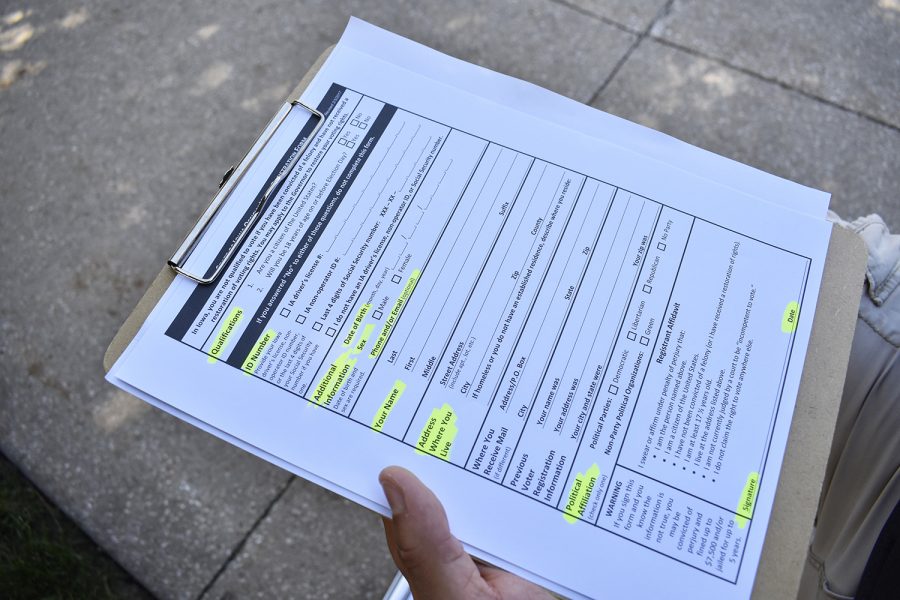Newby: Frustration fuels votes
The point of politics is people — it’s about us, so it’s time we find what we believe is best and vote about it.
A volunteer carrying voter registration forms is seen on the Pentacrest on Monday, September 17, 2018. Members of the University of Iowa ROTC read the U.S. constitution aloud in honor of Constitution Day.
October 23, 2018
Midterm elections have rounded the well-awaited bend with frustration commonly fueling casual conversations involving the question of: Who are you voting for? And even more so lately: Are you voting at all?
The answer often differs between those who deem this an opportunity to let their voices be heard, and those who have become comfortable in silence.
When frustration plays a factor in fueling political conversation, it’s important to take a step further than just talking about it — to invoke change in the political system, we need to vote.
“Psychology Today” offers a number of reasons for frustration over elections and, therefore, offers explanations for feelings fueling elections.
With campaign rallies and social-media timelines, it’s easy to see images and videos of faces contorted with rage, fists clenching signs with potent sentences scrawled across in ink, and opinions offered relentlessly online. Anger is easier to see when people are comfortable enough to sit behind a screen spewing controversial ideas.
And so, frustration is seemingly contagious. “Psychology Today” explains that a reason many people get angry is that they feel that their personal or professional goals, opinions, or positions are being blocked, ignored, and even devalued. When people don’t feel they have a place in the conversation, they place their frustrations in their voting platforms.
It’s good to be active in the conversations of policy, change, and overall politics. And it’s good to care about what is being said. Because what elected officials are pushing for is ultimately going to influence us. So it’s a positive thing to use your passion as action over the conversations erupting in politics.
RELATED: Efforts to attract the youth vote continue as Election Day approaches
“There is actually a place for healthy and productive anger in the political process,” said Ryan Martin on “Psychology Today.” “It is how one chooses to express that anger that matters most.”
As Martin urged, it’s productive to be angry in the political process. Filling conversations with purpose and ideas is more than needed at a time like this — in which our nation feels division in every discussion — and breaking down opinions and offering new perspectives gives way to unification in finding what matters most and doing something about it. It’s time we do more than talk about it; we vote about it.
According to NPR, a record number of female candidates have secured nominations for House seats — a whopping 185 women from both parties. And in March, according to the Center for American Women and Politics, at least 494 women — both Republicans and Democrats — said they were planning on running for Congress this year.
RELATED: NextGen America founder visits UI to engage youth voters
Speculations surfaced within those statistics that the sudden surge of women running for office correlated with frustration at the Trump administration.
Whether we are frustrated beyond measure regarding elected officials and the ideas, values, and beliefs they endorse, or if we completely align with our current government, it’s important we speak and make ourselves heard in acting in one simple step — by voting.
The point of politics is people — it’s about us, so it’s time we find what we believe is best and vote about it. Whether we’re overwhelmed with rage at the current state of our country or we’re pleased with the way things are looking, let’s vote. What our country, communities, and conversations become matters, and what we do about it matters more than anything else.






